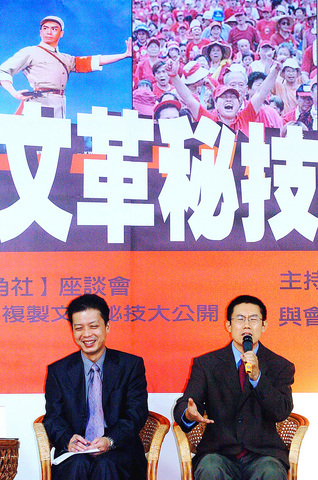Chinese dissident and writer Cao Changqing (
Cao said that there were many similarities between the anti-Chen campaign launched by former Democratic Progressive Party (DPP) chairman Shih Ming-teh (
Cao made the remarks at a forum hosted in Taipei by the media watchdog group Taiwan Society Herald (previously referred to as the "Bugle Society" in Taipei Times reports).

PHOTO: GEORGE TSORNG, TAIPEI TIMES
Cao, who experienced firsthand the cruelty of the Cultural Revolution as a young man, said that he had a sense of deja vu when seeing the anti-Chen campaign being waged in Taipei.
"It was a brutal age for China. It was an age full of hatred, anger and anxiety. I feel sad to see the `red' trend reappear in Taiwan," Cao said. "What I see in this anti-Chen campaign is that a handful of people are taking advantage of the masses to attain their political aims and destroy their political enemies, which is very similar to the Cultural Revolution."
Cao said that there were five ways in which the anti-Chen campaign echoed the Cultural Revolution.
First, the campaign was attempting to replace the rule of law with moral judgment and second, it was attempting to use mass movements instead of institutional reform to tackle problems.
Third, Cao said, the anti-Chen campaign was smearing its enemies with irresponsible accusations.
The campaign was convicting people in the court of public opinion, and employing the powerful influence of the mass media to create a "false majority," Cao said.
Noting that Chen was democratically elected as Taiwan's president with 6.4 million votes, Cao argued that Chen should be ousted through democratic procedures if, as Shih alleges, he is found to be corrupt.
"I think the pan-blue camp should take advantage of its legislative majority to revise the recall laws," Cao said. "It is unreasonable for Chinese Nationalist Party (KMT) Chairman Ma Ying-jeou (
Lu Shih-hsiang (
"No wonder some people say that the headquarters of the anti-Chen movement is not on Ketagalan Boulevard, but within some news stations," Lu said.
also see story:
Editorial: Who's afraid of lunch-box politics?

A preclearance service to facilitate entry for people traveling to select airports in Japan would be available from Thursday next week to Feb. 25 at Taiwan Taoyuan International Airport, Taoyuan International Airport Corp (TIAC) said on Tuesday. The service was first made available to Taiwanese travelers throughout the winter vacation of 2024 and during the Lunar New Year holiday. In addition to flights to the Japanese cities of Hakodate, Asahikawa, Akita, Sendai, Niigata, Okayama, Takamatsu, Kumamoto and Kagoshima, the service would be available to travelers to Kobe and Oita. The service can be accessed by passengers of 15 flight routes operated by

Chinese spouse and influencer Guan Guan’s (關關) residency permit has been revoked for repeatedly posting pro-China videos that threaten national security, the National Immigration Agency confirmed today. Guan Guan has said many controversial statements in her videos posted to Douyin (抖音), including “the red flag will soon be painted all over Taiwan” and “Taiwan is an inseparable part of China,” and expressing hope for expedited reunification. The agency last year received multiple reports alleging that Guan Guan had advocated for armed reunification. After verifying the reports, the agency last month issued a notice requiring her to appear and explain her actions. Guan

GIVE AND TAKE: Blood demand continues to rise each year, while fewer young donors are available due to the nation’s falling birthrate, a doctor said Blood donors can redeem points earned from donations to obtain limited edition Formosan black bear travel mugs, the Kaohsiung Blood Center said yesterday, as it announced a goal of stocking 20,000 units of blood prior to the Lunar New Year. The last month of the lunar year is National Blood Donation Month, when local centers seek to stockpile blood for use during the Lunar New Year holiday. The blood demand in southern Taiwan — including Tainan and Kaohsiung, as well as Chiayi, Pingtung, Penghu and Taitung counties — is about 2,000 units per day, the center said. The donation campaign aims to boost

The Central Weather Administration (CWA) said a magnitude 4.9 earthquake that struck off the coast of eastern Taiwan yesterday was an independent event and part of a stress-adjustment process. The earthquake occurred at 4:47pm, with its epicenter at sea about 45.4km south of Yilan County Hall at a depth of 5.9km, the CWA said. The quake's intensity, which gauges the actual effects of a temblor, was highest in several townships in Yilan and neighboring Hualien County, where it measured 4 on Taiwan's seven-tier intensity scale, the CWA said. Lin Po-yu (林柏佑), a division chief at the CWA's Seismological Center, told a news conference